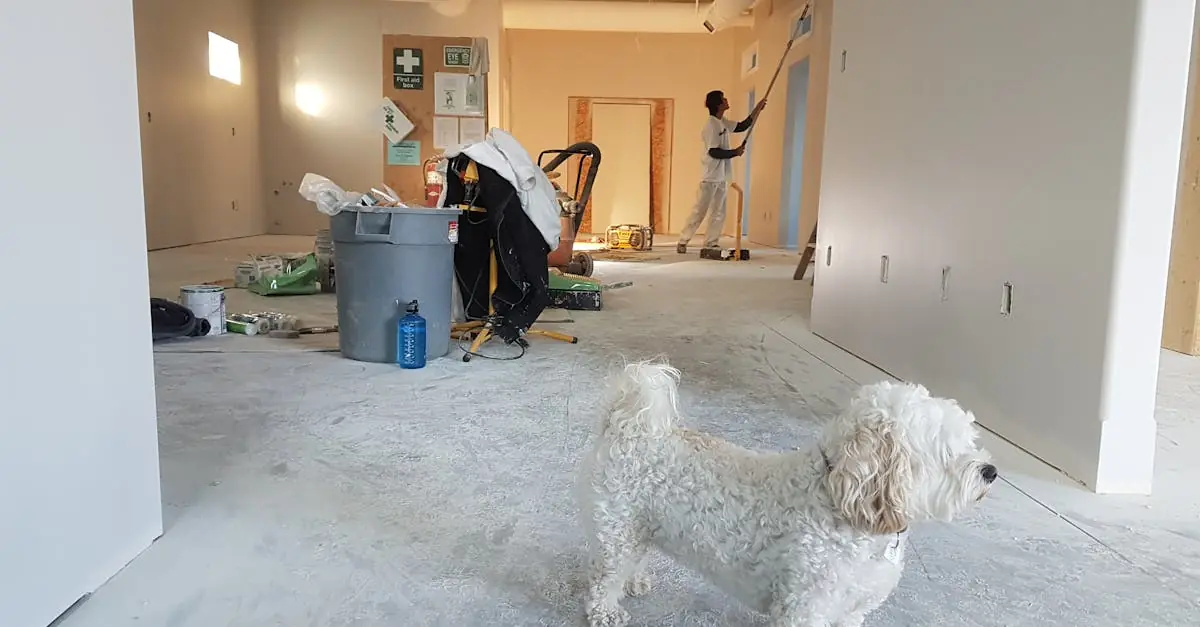Table of Contents
ToggleHome renovation can feel like a rollercoaster ride—exciting yet terrifying. One minute you’re dreaming of a chic kitchen, and the next, you’re staring at a bill that could fund a small country. It’s easy to get lost in the world of Pinterest boards and Instagram reels, but understanding home renovation costs is crucial if you want to keep your wallet intact.
From the glamorous upgrades to the not-so-glamorous hidden expenses, knowing what to expect can save homeowners from financial headaches. Whether it’s a simple paint job or a full-blown remodel, budgeting wisely is key. So grab your hard hat and calculator, because diving into the nitty-gritty of renovation costs might just be the best investment you’ll ever make—unless you count that avocado toast habit.
Understanding Home Renovation Costs
Home renovation costs can vary significantly based on multiple elements. Homeowners must recognize these factors to budget effectively.
Factors Influencing Renovation Costs
Location plays a major role in determining renovation costs. Urban areas often experience higher labor and material expenses compared to rural regions. Project scope directly impacts overall costs. Minor updates, such as painting or flooring, require less investment than extensive remodels, like kitchen overhauls or structural changes. Quality of materials affects pricing as well. High-end fixtures and finishes naturally increase a project’s price. Labor costs also fluctuate based on contractor rates and availability. Finally, unexpected issues, like plumbing or electrical problems, can emerge during renovations, adding to overall expenses.
Common Types of Home Renovations
Kitchens represent one of the most popular renovation types. Homeowners frequently invest in modern appliances and cabinetry, expecting high returns on investment. Bathrooms also attract attention, with upgrades like walk-in showers and energy-efficient fixtures. Basement refinishing has gained popularity in recent years, transforming unused spaces into functional areas. Outdoor renovations, including decks and landscaping, contribute to curb appeal and property value. Energy efficiency improvements like window replacements and insulation can reduce utility costs while enhancing comfort. Each renovation type offers distinct benefits and varying costs that homeowners should consider carefully.
Budgeting for Home Renovation Costs
Budgeting for home renovation costs requires careful planning and understanding of various expenses. Homeowners should account for both visible and hidden costs associated with their projects.
Setting a Realistic Budget
Setting a realistic budget involves analyzing project scope and desired outcomes. Homeowners must determine their financial limits before starting any renovation. Prioritizing essential updates and assigning costs to each element helps create a clear financial plan. For instance, kitchen remodels often range from $12,000 to $35,000 while bathroom updates can vary from $6,000 to $15,000. Factoring in a contingency fund of at least 10-15% of the total budget prepares for unexpected costs, ensuring a smoother renovation process.
Finding Hidden Costs
Finding hidden costs often surprises many homeowners during renovations. These costs frequently arise from permits, inspections, and potential structural issues. On average, permit fees can range from $400 to $2,000, depending on the project and location. Unforeseen issues, such as electrical, plumbing, or mold problems, might add thousands to renovation expenses. Moreover, delays can result in additional labor costs, stressing the importance of thorough pre-renovation assessments to uncover possible hidden expenses.
Strategies to Lower Home Renovation Costs
Homeowners can take several practical approaches to reduce expenses during renovations. Implementing cost-saving strategies not only eases financial stress but also enhances the overall renovation experience.
DIY vs. Hiring Professionals
Determining whether to tackle renovations independently or engage professionals significantly impacts costs. Homeowners often save money by doing some tasks themselves, such as painting or landscaping. However, expertise is crucial for complex jobs requiring specialized skills. Hiring professionals for plumbing and electrical work ensures safety and compliance with building codes, avoiding costly mistakes. Weighing expertise against project types can help make informed decisions.
Choosing Cost-Effective Materials
Selecting budget-friendly materials plays a vital role in reducing renovation expenses. Homeowners should consider alternatives like laminate countertops instead of granite or vinyl flooring instead of hardwood. Durable materials can also provide long-term savings, such as fiber cement siding over wood, which requires less maintenance. Researching local suppliers may reveal discounted or surplus materials. Balancing cost with quality remains essential to ensure a successful renovation outcome.
Estimating Home Renovation Costs
Estimating home renovation costs requires careful assessment. Homeowners must analyze various factors that influence expenses across different project types.
Cost Breakdown by Project Type
Kitchen remodels often represent the highest expenditure, averaging $25,000 to $50,000. Bathroom renovations follow closely, typically costing between $10,000 and $30,000. Basement refinishing usually falls in the range of $20,000 to $40,000. Outdoor improvements, such as deck installations, can range from $5,000 to $15,000, depending on materials. Energy efficiency upgrades, including new windows or insulation, generally cost between $2,500 and $15,000. Understanding these variations helps homeowners prioritize projects based on their budgets and objectives.
Tools for Cost Estimation
A variety of tools assist in estimating renovation costs effectively. Online calculators provide quick estimates based on input data. Cost estimator software helps streamline budgeting by offering project-specific calculations. Spreadsheet templates enable detailed cost tracking throughout the renovation process. Home improvement store services often include cost estimates from professionals for specific projects. Consulting with experienced contractors provides invaluable insights into realistic pricing and potential pitfalls. Using these tools streamlines financial planning and enhances decision-making during home renovations.
Navigating home renovation costs can be a complex journey but with the right knowledge and preparation, homeowners can achieve their desired outcomes without breaking the bank. By understanding the various factors that influence expenses and planning a realistic budget, they can minimize financial stress and avoid unexpected surprises.
Utilizing tools for cost estimation and consulting with experienced professionals can further enhance the renovation experience. Ultimately, a well-thought-out approach not only leads to successful renovations but also adds value to the home, ensuring that the investment pays off in the long run.





